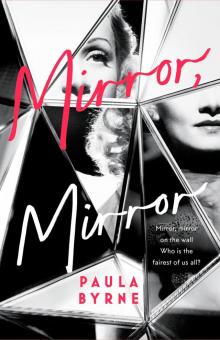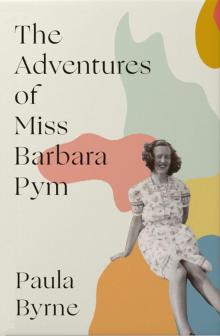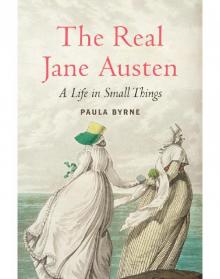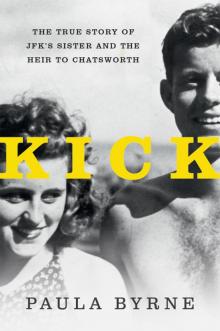- Home
- Paula Byrne
The Adventures of Miss Barbara Pym Page 9
The Adventures of Miss Barbara Pym Read online
Page 9
His kindness on this dreadful day went a long way and Pym was deeply grateful. It was the start of what would become one of the most important friendships of her life.
CHAPTER XXV
In which a Very Important Correspondence begins
Henry’s dreadful behaviour set the pattern for Pym’s relationships with other men: the more badly they treated her, the more deeply in love she felt. The worst aspect of it all was that she knew this and was powerless to stop herself.
Pym had asked Jock to write to her in Shropshire. He had promised to keep her informed of the ‘Watson Business’. Pym hereby began a correspondence that would last for the rest of her days. Mary Sharp had already written to Pym to say that Henry had taken Alison out to tea, but Jock, a would-be writer, gave her all the details:
Henry has been staring across at her house and the other night he thought he saw someone at the window and insisted on turning out the light and watching … Yesterday he took her to coffee at Fuller’s and they sat there from 11.30. She told him
• She always looks up at his window as she passes
• That all the living rooms and her bedroom face off the Banbury Rd
• That she lived alone with an old lady and was lonely.[1]
This was exactly the kind of forensic detail that Pym relished and she was very grateful. Indiscreetly, Jock told Pym that Alison was still ‘a maid’ (virgin) and that she wanted ‘Love’, but not with Henry. More importantly, Jock began a long-standing joke that Pym would eventually marry Henry. It gave her much-needed hope, was a source of endless amusement for them both, and made her feel that others were on her side. Both Jock and Barnicot thought Henry would be better off marrying Pym because they suspected Alison ‘had shrewish tendencies’. She was delighted to hear: ‘You might have her for a bridesmaid.’[2]
Jock revealed that Henry was writing Alison macabre love letters, quoting John Donne and telling her that he was desolate and heartbroken. Henry, too lazy or too heartless to write to Pym himself, scribbled a melodramatic postscript to Jock’s letter in his spidery handwriting: ‘She doesn’t love me. It is the end. Write and comfort my last moments.’ Alison had told Jock that the next time she met Pym she was going to ‘put out her tongue to you’.[3]
Pym replied instantly and asked for constant updates, which Jock was only too willing to provide. It had not taken Jock long to realise that Pym was rather special. If he had no real idea, at this stage, of the extent of her talent, he no longer considered her as the foolish and annoying limpet. He sent another long and witty letter which was cheering, even though it contained the news that Henry was in love with Alison – mainly it seems because she was playing hard to get and not falling instantly into his arms. Jock was kind and sympathetic: ‘Poor dear Pym, I am so sorry that you have wept so many tears over Henry and I wish I could give you more comfort. I am afraid he really is in love with West-Watson.’[4] He added spitefully that Alison would be more expensive to keep than Pym because of her voracious appetite.
Jock captured Henry’s idiosyncrasies perfectly: his melodramatic groaning, his laziness, his spoiled manner, his affectation. Pym too would hungrily store up these details and use them later in her novel about Henry. Alison told Henry that she was going to a party in Cambridge, but Jock and Henry spotted a handsome young man at her door. Jock noted how he ‘preened’ himself before ringing her doorbell. Jock and Henry were just as bad as Pym in spying on other people. The high windows of their lodgings in Banbury Road lent themselves to this habit.
Jock, who had mixed feelings towards Henry, seemed to relish Alison’s treatment of him. His letters about the affair are full of malicious wit and spite. He was clearly as fascinated with Henry as Barbara was. He told Pym that he made Henry an apple pudding because of the biblical Song of Solomon’s advice: ‘Comfort me with apples, for I am sick of love.’ Alison had called to see Henry and Jock, acting as chaperone on behalf of Pym, left his sauce to curdle (he was a keen cook). Jock felt sure that Alison disliked him (perhaps homophobically?). This drew Jock and Pym together. Henry added a postscript to the letter, complaining that Pym only wrote to Jock, not to him, and (cruelly) emphasised his infatuation for Alison – ‘I have cut my finger and can’t write. Why don’t you write to me instead of Jock Liddell … I am very bored, for the light of my life is going away tomorrow’.[5] He signed his name in his own blood.
All this only deepened Pym’s resolve not to write to Henry. ‘I am beginning to feel the wee-est bit hostile towards Henry and to think that the glamour of being his doormat is wearing off some.’[6] That day, she listened to a radio production of The Seagull and was very taken by its portrayal of unrequited love. She copied out Masha’s lines: ‘I am in mourning for my life. That is why I wear black. I am unhappy.’[7]
But, despite her Chekhovian leanings, Pym was feeling quietly excited by a plan she had been secretly hatching. She had been learning to speak German and was off to visit Nazi Germany.
BOOK THE SECOND
Germany
CHAPTER I
Miss Pym tours Germany
In the spring of 1934, a young English girl fell in love with Nazi Germany. She was someone with an obsessive nature and she needed a cause. Like many English people, she was deeply impressed by the new chancellor, Adolf Hitler, who was restoring Germany’s economy and sense of pride. She set out to stalk Hitler, monitoring his movements and waiting in his favourite restaurant for a sighting. When she saw him, she sat staring, waiting patiently for the moment that he would notice her and notice her he did.
When not in Germany, she lived in a small Oxford village. Here she startled the local shopkeeper and villagers when she came to the village shop dressed in a black shirt and ordered a twopenny chocolate bar, flinging out her arm in the Nazi salute with a cry of ‘Heil Hitler!’[1] Tall, blonde and with startling blue eyes, she had been conceived in the village of Swastika in Ontario. Her name was Unity Valkyrie Mitford and she was a year younger than Barbara Pym. Both women were in Germany in the spring of 1934 and both were caught up in the ‘heady excitement’ of the Nazi regime.
Pym was one amongst many tourists flocking to Germany to witness the transformations wrought by the Third Reich. Writers, journalists, artists and students came in their thousands, responding to Joseph Goebbels’s carefully orchestrated advertising machine. He understood the propaganda value of tourism and his aim was to show Germany as a benign, benevolent country. ‘Germany Invites You’ claimed the Thomas Cook & Son posters showing images of beautiful young people in lederhosen and Tyrolean hats, fairyland castles and mountain ranges framing the background.
Many writers toured the Third Reich in these years, amongst them Samuel Beckett, Thomas Wolfe, Karen Blixen and Albert Camus. In the spring of 1935, a year after Pym’s first visit, Virginia and Leonard Woolf drove through Germany on their way to Rome. In contrast to Pym, they were distinctly unimpressed by what they saw. In Heidelberg, Virginia noticed the ‘dons and their daughters tripping out to each other’s houses with pale blue Beethoven quartets under their arms’. But she described the German countryside as ‘pretentious’, the scenery ‘operatic’ and the hills ‘high but insignificant’. Leonard noted the grim storm troopers.[2]
Like Unity Mitford, Pym was mesmerised. At Oxford, she had been drawn to German music and culture. ‘Auf Wiedersehen’ and ‘Wien, du Stadt meiner Träume’ were her ‘Rupert’ love songs, and she enjoyed German cinema. She was good at languages and had been learning German at Oxford mainly in preparation for a National Union of Students visit to Cologne. Her St Hilda’s friend, Dorothy Pedley, was also signed up. Pym was glad to leave behind the painful and messy affair with Henry.
In fact, Pym was soon to be plunged into another complicated relationship. In her diary on 29 March 1934 she wrote: ‘Today was the beginning of a very happy week of my life, which may make a difference to my future.’[3]
At Aachen, the girls were met by a customs officer, who came to look at their books. Only
a year before, the German Student Union had orchestrated a series of public book burnings in Germany and Austria. Enthusiastic crowds witnessed the burning of works by Bertolt Brecht, Albert Einstein, Sigmund Freud, Thomas Mann and Erich Maria Remarque, among other well-known intellectuals, scientists and cultural figures, many of whom were Jewish. The largest of these bonfires occurred in Berlin, where an estimated 40,000 people gathered to hear a speech by Goebbels, in which he pronounced that ‘Jewish intellectualism is dead’ and endorsed the students’ ‘right to clean up the debris of the past’.
If Barbara had any reservations about her books being checked, she did not show it – only remarking how satisfying it was to hear German spoken by the customs officer.
By the time Barbara and Dorothy arrived in Cologne, they were feeling exhausted and dirty. They were met by German students who took them by bus to a youth hostel where they had breakfast and then a sleep before lunch. Pym found the other students dull and was starting to regret her decision to travel to Germany. But it was all to change.
Pym was thrilled when she caught sight of ‘real Nazis’. One of them was called Friedbert Glück and he was wearing the black uniform of the SS. The other men wore the brown shirts, with the swastika armband, of the Stormtroopers (SA). Pym noted that the men saluted each other ‘in the Heil Hitler manner’.[4] She and Dorothy went to luncheon where speeches were made welcoming the foreign visitors. Pym was mesmerised by the handsome blackshirt, Glück:
Friedbert spoke in German – I remember being impressed by him and thinking him a marvellous unapproachable Nazi. What did he look like? Tall with a lovely figure set off to advantage by the black uniform – very dark with smooth black hair and a high forehead-dark complexion and greyish green eyes – (actually I found out most of this later) rather strange looking but undoubtedly fascinating.[5]
After lunch, they toured Cologne and enjoyed looking at the pictures in the museum. Before dinner, she and Pedley shopped for cigarettes, oranges, and Pond’s Cold Cream. When she went to bed, Pym thought of Henry: ‘I ended up still being in love with Gabriel, however much the Nazis had impressed me.’[6]
Barbara was certainly not unique in being swept up in the excitement of the Third Reich and the way in which the Hitler youth played such a pivotal role: there were marching bands, pageants and rallies, red flags and swastikas, all proclaiming signs of a restored national pride. The Nuremberg rally the previous year had attracted many UK tourists, including Unity Mitford and her sister Diana. By the summer of 1934, Unity had become part of Hitler’s inner circle. She also engaged in love affairs with blackshirts, whom she called ‘storms’.
Despite the sinister signs in Hitler’s new Germany, most tourists were happy to look the other way. As late as 1937, the Duke and Duchess of Windsor toured the new Germany, including a visit to a concentration camp. When the duke asked what it was, he was told: ‘It is where they store the cold meat.’[7]
CHAPTER II
In which Fräulein Pym falls for a Handsome Nazi
By the beginning of April, Pym had entered what she deemed ‘a new period of her life’. One evening she attended the opera to see Wagner’s Die Walküre (the opera that inspired Unity Mitford’s middle name). She had met a bearded man at the performance. He invited her into his box and she allowed him to stroke her arm and her ankle. Afterwards they drank ‘lovely cool hock’ in a cafe and then went on to another cafe by the river, ‘a lower class one – where there was real dancing and fat families swaying in time to the music’.[1] She allowed the bearded man to kiss her. Perhaps she permitted more than a kiss, as a half-page of her diary is cut out.
When the narrative continues, we find Pym at a party with a Nazi called Hanns Woischnik. ‘We made much noise and drank quite a lot. After the party had broken up, Hanns and I went around the corner and he kissed me several times in the German way, perhaps “with inside lip”, but I did not mind. He was very sweet and asked me to go to his … [deleted lines].’[2] Hanns would subsequently become a Nazi-approved academic, with a doctoral thesis entitled ‘Júlio Dinis as Novelist and Love Psychologist’. (Dinis was the pen name of Portugal’s first modern novelist; during the war, Portugal was officially neutral but of great value to Germany.)
The next day, Pym went on a steamboat trip down the Rhine wearing a grey silk scarf that belonged to Hanns, and a summery green dress. She flirted with Hanns, who gave her his address and asked her to write to him when she returned to England. But the man she was really interested in was Friedbert Glück. She got into conversation with him. ‘He was looking sweet and he hadn’t shaved because his chin was gloriously black and rough.’ He wasn’t wearing his black uniform, but looked fetching in flannel bags, a brown tweed coat, a flowery tie and an ‘exquisite shirt’. Instead of his SS peaked cap, he wore a green Bavarian-style teardrop hat.[3]
The day was hot and the group drank white wine: ‘Fancy being nearly drunk in the morning!’ They landed at Bonn for a tour of the university and at lunch Pym felt ‘excited and hot and couldn’t eat much’. They then set off on the steamer for Königswinter, where they boarded the rack railway to climb the mountain of Petersberg. By this time, she and Friedbert were staying close together. ‘The district is lovely,’ wrote Pym, ‘mountains with forests topping them and romantic looking castles. Many cafes and tables outside of course … everyone happy and lovely weather.’ At the summit, they took tea at a cafe, where the air was beautifully clear and the cakes were ‘of a size and lusciousness quite unequalled in England’. Friedbert lent Barbara his green hat to shield her from the sun. After tea, they wandered and looked out at the lovely view. Pym was filled with joy. ‘All the time Friedbert was very sweet – why couldn’t I have stayed there always – so happy with someone so nice.’ Down in Königswinter, they drank a delicious beverage consisting of wine, sliced oranges and herbs. Friedbert told Pym that he wished she could stay in Germany so that they could tour his beautiful nation together. ‘It was as romantic as anything could possibly be.’[4] In the next breath, she saw Hanns, who complimented her and held her hand.
On the steamer home, the party drank nine bottles of wine and Barbara felt intoxicated and ‘gloriously happy’. Friedbert put his arm around her and kissed her: ‘I suppose we didn’t behave well – but what did it matter?’ By now the entire group was inebriated. Shouting and singing broke out: ‘We sang God Save the King and Deutschland über Alles. That rather worried Friedbert although I couldn’t understand why. He and Hanns had an animated talk about it in German.’[5] She was clearly oblivious to any political undercurrents surrounding the behaviour of the two young men.
Pym went with Friedbert to the lower deck and they ‘close-kissed’. She felt that she was living in the moment: ‘An exhilarating sensation too seldom enjoyed.’ Pym was simply delighted that a young man was treating her kindly: ‘It was so lovely to have someone saying nice things to me after Gabriel’s rudeness and unkindness. I at last began to realise that there could be something in my life beyond Gabriel.’[6] It was a little unfortunate that the only man who came close to expelling the memory of Henry Harvey happened to be an officer of the SS.
Pym headed back to England, sad to be parting from Friedbert and Hanns. Friedbert told her that he had singled her out, even before he knew her name, claiming, romantically, that she was like the English song, his ‘Secret Passion’. They had a fond farewell; and she felt that she had left her heart behind in Cologne.
On the journey home, she fell asleep and woke up to the unwanted fondling of a fat Frenchman. She bolted and moved away.[7] Other than this unsavoury incident, it was a pleasant trip. As soon as she reached London, she bought herself a German dictionary and Vernon Bartlett’s new book, Nazi Germany Explained.[8] Pym had indeed left her heart in Germany.
CHAPTER III
In which Sandra returns to Oxford and loses her Swastika Badge somewhere on the Banbury Road
‘One important thing seemed to have happened to me,’ Pym wrote in her diary: ‘My t
our in Germany meant that I began to take an interest in Hitler, Nazis and German politics.’[1] She had brought souvenirs home with her, including a precious swastika pin that was a gift from Friedbert. She fashioned a swastika design on a scarlet box. She wrote letters to Friedbert and Hanns. For once, Oxford had lost its allure. She dreamt of Friedbert and being on the Rhine.
Listening to dance music on the wireless made Pym feel nostalgic. ‘Let There Be No Heartaches, No More Tears’, reminded her of Henry. ‘As far as Gabriel is concerned I don’t think there will be any more,’ she added. The next song, ‘I’ll See You in My Dreams’, reminded her of Friedbert, ‘and that is probably the only time I shall see Friedbert again’. At this point a double page in the diary has been torn out.[2]
Pym returned early to Oxford and rented a room in Ship Street. She had been reading Samuel Butler’s risqué novel The Way of All Flesh, notable for its assault on Victorian hypocrisy, its crisis of religious faith and an incident in which a man sexually assaults a young woman whom he wrongly believes to be of ‘loose morals’. Pym saw Jock in the library, who she found was his usual sweet self. And she went shopping and bought an ‘exciting’ red, black and white checked skirt that she considered ‘very Sandra’.[3] The weather was fine; almond trees in blossom made her think of the Rhine and Friedbert. In the meantime, she had a secret affair with a brother of her friend, Paul Hussey. He was called Bill and she wrote that it was nice to receive admiration and compliments.
It was not long before she had a long letter in German from Friedbert, who also sent a photograph of himself and a copy of one of Hitler’s speeches. Pym longed to have the time to translate his letter. In Ship Street, she spotted Henry, following an absence of six weeks. She also saw Barnicot, with ‘the real count’, Roberto Weiss. The next day, Henry called in at her digs and asked Pym to join him, Jock and Barnicot for supper that evening. Whilst he was there, he translated part of Friedbert’s letter (‘very satisfactorily!’ she noted). Henry was clearly a little jealous of Friedbert’s existence.

 Mirror, Mirror
Mirror, Mirror Belle
Belle The Adventures of Miss Barbara Pym
The Adventures of Miss Barbara Pym The Real Jane Austen
The Real Jane Austen Look to Your Wife
Look to Your Wife Kick
Kick Perdita
Perdita Mad World: Evelyn Waugh and the Secrets of Brideshead (TEXT ONLY)
Mad World: Evelyn Waugh and the Secrets of Brideshead (TEXT ONLY)